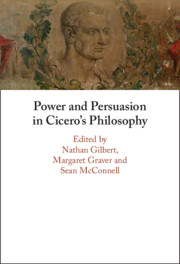Book contents
- Power and Persuasion in Cicero’s Philosophy
- Power and Persuasion in Cicero’s Philosophy
- Copyright page
- Contents
- Contributors
- Note on Texts and Translations
- Introduction
- Part I Techniques and Tactics of Ciceronian Philosophy
- Part II Political Philosophy and Ethics
- Chapter 6 Iuris consensu Revisited
- Chapter 7 The Psychology of Honor in Cicero’s De re publica
- Chapter 8 Cicero on the Justice of War
- Chapter 9 Towards a Definition of Sapientia
- Chapter 10 Old Men in Cicero’s Political Philosophy
- References
- Index Locorum
- General Index
Chapter 10 - Old Men in Cicero’s Political Philosophy
from Part II - Political Philosophy and Ethics
Published online by Cambridge University Press: 15 January 2023
- Power and Persuasion in Cicero’s Philosophy
- Power and Persuasion in Cicero’s Philosophy
- Copyright page
- Contents
- Contributors
- Note on Texts and Translations
- Introduction
- Part I Techniques and Tactics of Ciceronian Philosophy
- Part II Political Philosophy and Ethics
- Chapter 6 Iuris consensu Revisited
- Chapter 7 The Psychology of Honor in Cicero’s De re publica
- Chapter 8 Cicero on the Justice of War
- Chapter 9 Towards a Definition of Sapientia
- Chapter 10 Old Men in Cicero’s Political Philosophy
- References
- Index Locorum
- General Index
Summary
In his philosophical works Cicero addresses a number of questions concerning the role of old men in politics, most obviously in his dialogue De senectute of 44 bce. How best should the old participate in politics and the wider community – what, if anything, do the old have to offer that is special or unique? How should the generations fit together in the body politic, and should age be a factor in the structural organisation of states? Should the old rule? Through a close reading of De senectute, I argue: (1) Cicero develops a coherent line on the special political role of old men, which can be seen as a call to arms in the contemporary Roman political context; and (2) this line is not just a restatement of traditional Roman ideals: Cicero draws on and adapts some of the most important arguments from Plato’s Republic and his earlier De re publica when addressing these questions regarding the role of old men in politics.
Keywords
- Type
- Chapter
- Information
- Power and Persuasion in Cicero's Philosophy , pp. 218 - 240Publisher: Cambridge University PressPrint publication year: 2023

